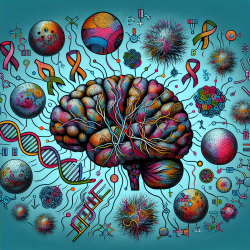Welcome to the World of Neurological Disorders
As a practitioner working with neurological disorders, staying informed about the latest research and findings is crucial. The recent study titled "Global, regional, and national burden of disorders affecting the nervous system, 1990–2021: a systematic analysis for the Global Burden of Disease Study 2021" provides valuable insights into the global burden of neurological disorders and offers guidance on improving patient outcomes.
The Importance of Understanding Neurological Disorders
Neurological disorders are diverse and include conditions such as stroke, Alzheimer's disease, epilepsy, and more. These disorders can lead to significant disability and mortality, making it essential for practitioners to stay updated on the latest research and treatment strategies.
Key Findings from the Study
The study highlights several important findings that can help practitioners improve their skills and provide better care for patients:
- Global Burden: Neurological disorders are the leading cause of disability-adjusted life years (DALYs) worldwide, affecting over 40% of the global population.
- Top Conditions: The ten conditions with the highest DALYs include stroke, neonatal encephalopathy, migraine, Alzheimer's disease, diabetic neuropathy, meningitis, epilepsy, and more.
- Prevention and Treatment: Effective prevention, treatment, and rehabilitation strategies are needed to address the growing burden of neurological disorders.
How Practitioners Can Implement These Findings
Practitioners can use the insights from this study to enhance their practice and improve patient outcomes. Here are some actionable steps:
- Stay Informed: Regularly attend conferences, webinars, and read publications to keep up with the latest research and treatment advancements.
- Focus on Prevention: Educate patients about modifiable risk factors, such as high blood pressure and smoking, to reduce the risk of neurological disorders.
- Enhance Rehabilitation: Collaborate with therapists and rehabilitation specialists to develop comprehensive care plans for patients with neurological disorders.
- Advocate for Resources: Work with policymakers to ensure adequate resources and support for neurological disorder research and treatment facilities.
Encouraging Further Research
The study also emphasizes the need for further research into modifiable risk factors and effective treatment strategies. Practitioners are encouraged to participate in research studies and contribute to the growing body of knowledge on neurological disorders.
Conclusion
Understanding the global burden of neurological disorders and implementing effective prevention and treatment strategies is crucial for practitioners. By staying informed and actively participating in research, practitioners can improve patient outcomes and contribute to the global effort to reduce the impact of neurological disorders.
To read the original research paper, please follow this link: Global, regional, and national burden of disorders affecting the nervous system, 1990–2021: a systematic analysis for the Global Burden of Disease Study 2021.










